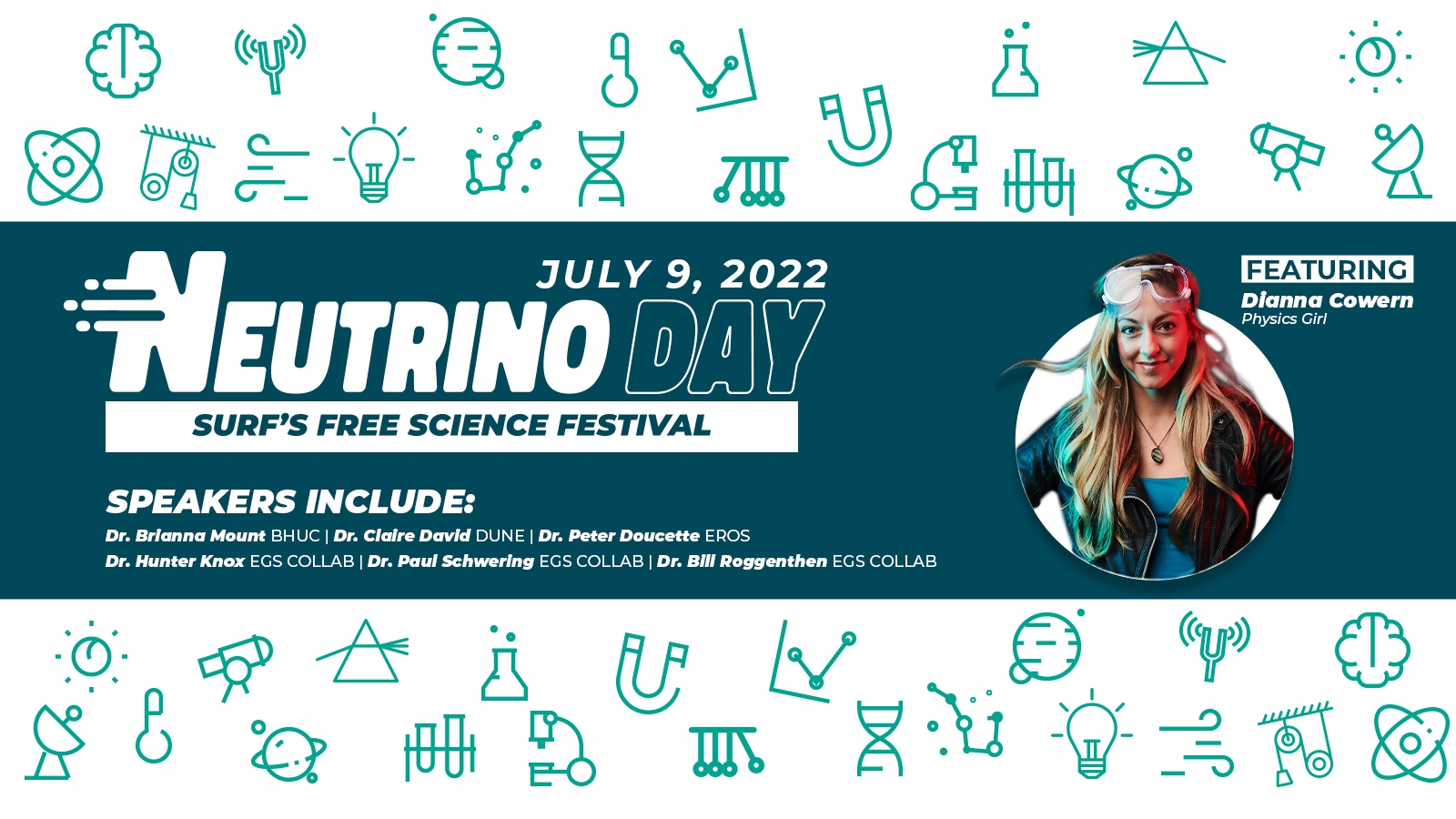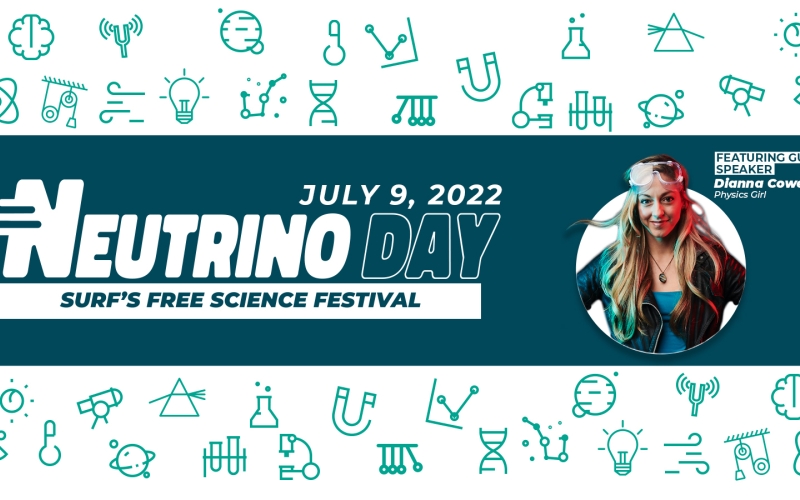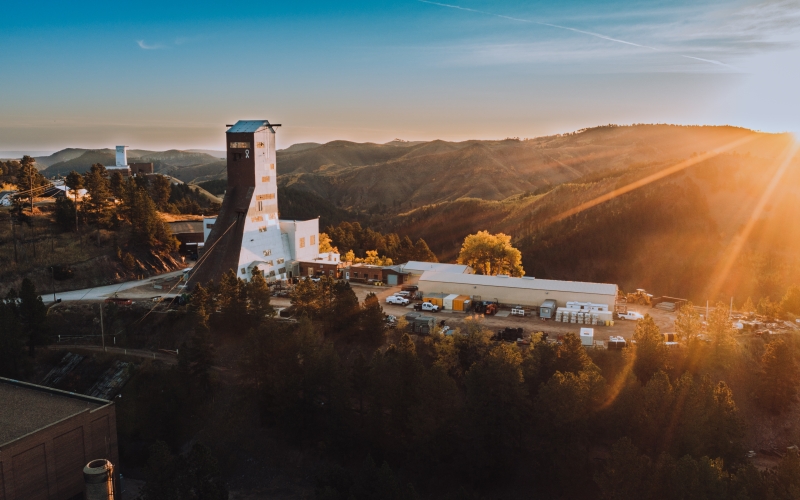
Neutrino Day truly has something for everyone. For those who want a deeper understanding of science and the opportunity to ask scientists about their research, our scheduled talks and livestreams from the underground are for you!
At Neutrino Day, dive deep with experts in the fields of neutrino physics, low background counting, Landsat satellites and geothermal energy research. Our experts will address questions like: How do satellites map the Earth even as it spins through space? Can we use the Earth’s heat like a rechargeable battery? What’s so weird about neutrinos? And how can we make the quietest places on Earth even quieter?
Explore the talks at Neutrino Day on Saturday, July 9. All times are Mountain Time. For a full schedule of events, visit NeutrinoDay.com.
“Background check! Screening materials for rare-event searches” with Dr. Brianna Mount
When building super sensitive detectors, particle physicists require that materials be extremely radio-pure. As the director of the Black Hills State University Underground Campus (BHUC), Dr. Brianna Mount manages the assaying, or testing, of materials to be used for such experiments.
On Neutrino Day, Mount will join us via livestream from her laboratory space on the 4850 Level of SURF. You’ll get to peer inside ultra-sensitive detectors, answer fun poll questions and ask Mount about her research and work underground.
“I'm so excited to speak with folks of all ages and show them what it's like to work a mile underground!” said Mount, who is also an associate professor of physics at BHSU.
“Background check! Screening materials for rare-event searches” with Dr. Brianna Mount begins at 10 a.m. at the Sanford Lab Homestake Visitor Center.
“DUNE: Piercing the secrets of neutrinos and the Universe” with Dr. Claire David
Particle physicists are very curious about neutrinos. And after Dr. Claire David’s talk, we think you will be, too!
Neutrinos are one of the most abundant elements in the cosmos, and yet they barely interact with matter. Their strange characteristics have fascinated researchers since their discovery, and there’s still much to learn. The Deep Underground Neutrino Experiment (DUNE) is an international project dedicated to uncovering the mysteries of neutrinos.
“What are neutrinos? These tiny chunks of matter are as abundant as they are difficult to detect. Embark on DUNE, the future underground telescope that will unveil the mysteries behind neutrinos and help us better understand the Universe!” said David, assistant professor of physics at York University and member of the DUNE collaboration.
“DUNE: Piercing the secrets of neutrinos and the Universe” with Dr. Claire David begins at 11 a.m. at the Historic Homestake Opera House.
“Hard Rock Concert: Breaking into the Geothermal Good Life” with Dr. Hunter Knox, Dr. Paul Schwering and Dr. Bill Roggenthen
As heat boils in the Earth’s deep subsurface, researchers around the world are developing better ways to tap into that energy source. The rock at SURF isn’t hot. But it’s perfect for researchers with the Enhanced Geothermal Systems (EGS) Collab who want to study rocks at relevant depth and pressures—without sweating the extreme temperatures.
On Neutrino Day, EGS Collab researchers Dr. Hunter Knox and Dr. Paul Schwering will join us via livestream from their test site on the 4100 Level of SURF.
“The EGS Collab project wants to understand rock properties and to conduct experiments on increasing permeability in very hard, crystalline rock as a means for securing geothermal energy across the country,” Schwering said. “Please join us for Neutrino Day, where myself and members of the EGS Collab team will talk about the amazing experiment we're conducting underground at SURF.”
“Hard Rock Concert: Breaking into the Geothermal Good Life” begins at 1 p.m. at the Sanford Lab Homestake Visitor Center.
“Observing the Earth’s land surface from space at 17,000 miles per hour” by Dr. Pete Doucette
You may think you know our planet well, but have you ever wondered how Earth’s land surface changes over time? Dr. Pete Doucette is the acting director for the Earth Resources and Observation Science (EROS) Center in Sioux Falls, South Dakota.
On Neutrino Day, Doucette will demonstrate how Landsat satellites have been imaging the Earth’s land surface from space at speeds of 17,000 miles per hour, and over many years. You’ll hear how scientists use satellite measurements of visible and invisible light, together with machine learning methods, to help track and understand the amazing changes occurring to the land surface across our home planet.
“The Earth is our home. Neutrino Day is a great opportunity to come and learn about how science is used to understand and protect our home today and for future generations,” said Doucette.
“Observing the Earth’s land surface from space at 17,000 miles per hour” with Dr. Pete Doucette begins at 2 p.m. at the Historic Homestake Opera House.
Neutrino Day finale with Physics Girl creator, Dianna Cowern
Neutrino Day’s headlining speaker is Dianna Cowern, creator and host of the viral “Physics Girl” YouTube series. With over 2 million subscribers, “Physics Girl” is a resource for fun physics videos and has featured such legendary figures as Bill Nye.
“We are so excited to bring Dianna Cowern to SURF for Neutrino Day,” said Constance Walter, communications director. “She has an enthusiasm for physics and passion for education that fits beautifully with the mission of Neutrino Day and SURF.”
Cowern researched dark matter as an undergraduate at MIT and low-metallicity stars as a post-baccalaureate research fellow at the Harvard-Smithsonian Center for Astrophysics—before working at GE as a software engineer designing mobile apps. Now, she invites everyone into the world of physics through experiments, demonstrations and cool new discoveries.
“I love how physics can explain the weird quirks of our universe,” Cowern said.
Cowern’s talk is our Neutrino Day finale and will take place at 4 p.m. at the Historic Homestake Opera House.


